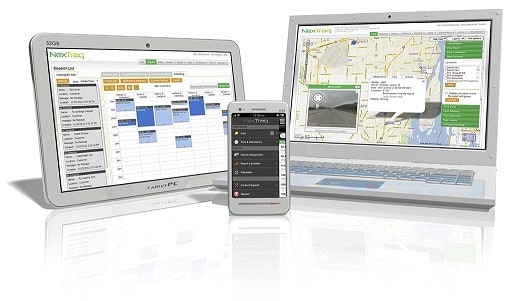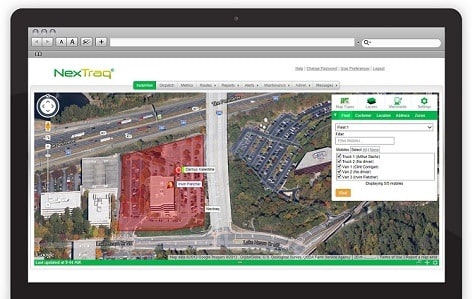Waste management businesses can use a GPS fleet tracking solution to ensure operations run smoothly, but also to reduce costs and better manage vehicles and employees. With actionable data regarding scheduling to asset management, managers have the tools they need to run a profitable business.
Wyn Partington
Professionals in the solid waste and recycling management industries value operational efficiency and are constantly working to improve field performance. From collection to processing, business managers must keep operations running efficiently and smoothly. One hiccup in day-to-day operations can create a backlog of materials that can reduce productivity and cause a waste management business to play “catch up” for the rest of the week.
Real-Time Information
To avoid this backlog, waste management businesses must implement efficient processes into operations to ensure jobs run smoothly and tasks are completed on schedule. While many tools are available, a GPS fleet tracking solution can achieve this while also reducing operational costs and providing visibility into the field. According to the Aberdeen Group, 45 percent of service and manufacturing organizations reported that the development of visibility into technicians, vehicles and resources was a key part of ensuring improved field service operations. In addition to streamlining communication between the field and home base, a GPS fleet tracking solution can provide actionable data that can optimize operations and help customer service handle any customer disputes or complaints.
Most professionals in the industry are aware that a GPS fleet tracking solution provides insights into the location of vehicles, employees and assets. Such a solution provides real-time information regarding where vehicles have been, how long they were stopped at each location and comprehensive activity updates. Managers are able to easily access this information and receive confirmation that day-to-day tasks, such as waste and recycling pick up, are completed on schedule and in a timely manner. A GPS fleet tracking solution can also identify any unauthorized stops or excessive breaks, which can improve payroll accuracy.
Route Optimization
In addition, having details regarding the location of vehicles, duration and timestamps for stops can provide proof of location to resolve any customer disputes. If a customer complains that their materials were not picked up as scheduled, managers can quickly pull up information on a vehicle within the platform regarding the associated driver to easily confirm or dispute the claim.
Route optimization is also an important feature of a GPS fleet tracking solution that can support materials collection operations. Employees may have regular routes that they travel each day, but what if there is unexpected construction or major traffic congestion? Delays in the regular route can affect operations for the rest of the team and can delay productivity. Route optimization is a feature provided by a comprehensive GPS fleet tracking solution—it takes all of the stops in a driver’s itinerary and orders them to create the shortest route. It will also alert drivers if there is an incident in their path, such as traffic congestion, and provides an alternative optimized route. Employees can then follow voice-guided, turn-by-turn directions to help them maneuver around any delays with ease, ensuring they complete their route on time.
A comprehensive fleet management solution should provide the option for all of this directional information to be sent directly to the employee’s in-vehicle personal navigation device (PND), smartphone or tablet. Employees can also use the devices and the apps provided by the GPS fleet tracking solution to send status updates to management, maintaining the connection between the office and the field. Mobile applications allow workers to automatically assign themselves to vehicles, immediately report maintenance issues and update odometer readings. Field employees can also record start times, break times and end work times through such a mobile app to eliminate unnecessary driving to check in or out of the office each day.
In addition to providing information regarding materials collection management, business managers can create geofences, virtual perimeters, around specific locations such as the materials processing site. If a driver enters or leaves a set perimeter, managers can receive an instant alert via email or text. This allows management to be alerted of any employees that may be arriving late or leaving early.
Reduce Operational Costs
In any business, managers are always looking for ways to reduce operational costs and increase revenue. For a fleet-based business, fuel is a necessary cost that is often difficult to reduce. However, a comprehensive GPS fleet tracking solution should include a number of fuel management features that can reduce spending and identify any behaviors that may be using more fuel than necessary. As previously discussed, efficient routing will automatically reduce fuel spend as routes are optimized and excessive driving is eliminated. A GPS fleet tracking solution should offer a number of fuel reports that can identify behaviors that waste fuel, such as idling or rapid acceleration, and provide detailed insights into fuel consumption, identifying where a business can cut back or improve. In addition, fuel cards can be used to track fuel and maintenance purchase information. Streamlining this process also means less time managing paper work and provides a more accurate view of fleet fuel consumption.
Asset management is also a concern for businesses in the waste and recycling industries, especially at processing job sites. Expensive assets are often left unattended overnight and if these assets are lost or stolen, companies lose both time and money. According to the National Insurance Crime Bureau’s (NICB) 2012 Equipment Theft Report, annual estimates of the cost of equipment theft are around $400 million and can cost up to $1 billion. Asset tracking technology allows business managers to monitor equipment in any environment by using built-in motion sensors, which trigger an immediate alert to the manager if it leaves the designated area. The tracking technology will pinpoint the exact location of the asset, allowing for businesses to recover the equipment and for operations to return to normal as quickly as possible.
Waste industry professionals can also use Power Take Off (PTO) sensors to monitor any extension of a vehicle used in the working process. Management is able to see in real-time if a vehicle’s PTO mechanism is engaged, for example, when the compactor is being operated. In addition, management can easily report on when the extension is being used, offer detailed information regarding the time, location and duration of use, providing management with concrete data to help validate jobs.
Ensuring Operations Run Smoothly
Waste management businesses can use a GPS fleet tracking solution to ensure operations run smoothly, but also to reduce costs and better manage vehicles and employees. With actionable data regarding scheduling to asset management, managers have the tools they need to run a profitable business.
Wyn Partington is the Vice President of Marketing of NexTraq (Atlanta, GA). NexTraq’s applications include Fleet Dispatch, Fleet Metrics and NexTraq Connect, delivering real-time data needed to optimize fleet operations. With nearly 20 years of experience in the technology industry, Wyn brings extensive knowledge and strategic insight to his role. He has been with NexTraq for six years and has a proven track record in planning, building and executing successful marketing strategies to increase brand identity and drive lead generation. Wyn can be reached at (678) 762-6800 or (800) 358-6178 or visit www.nextraq.com.


